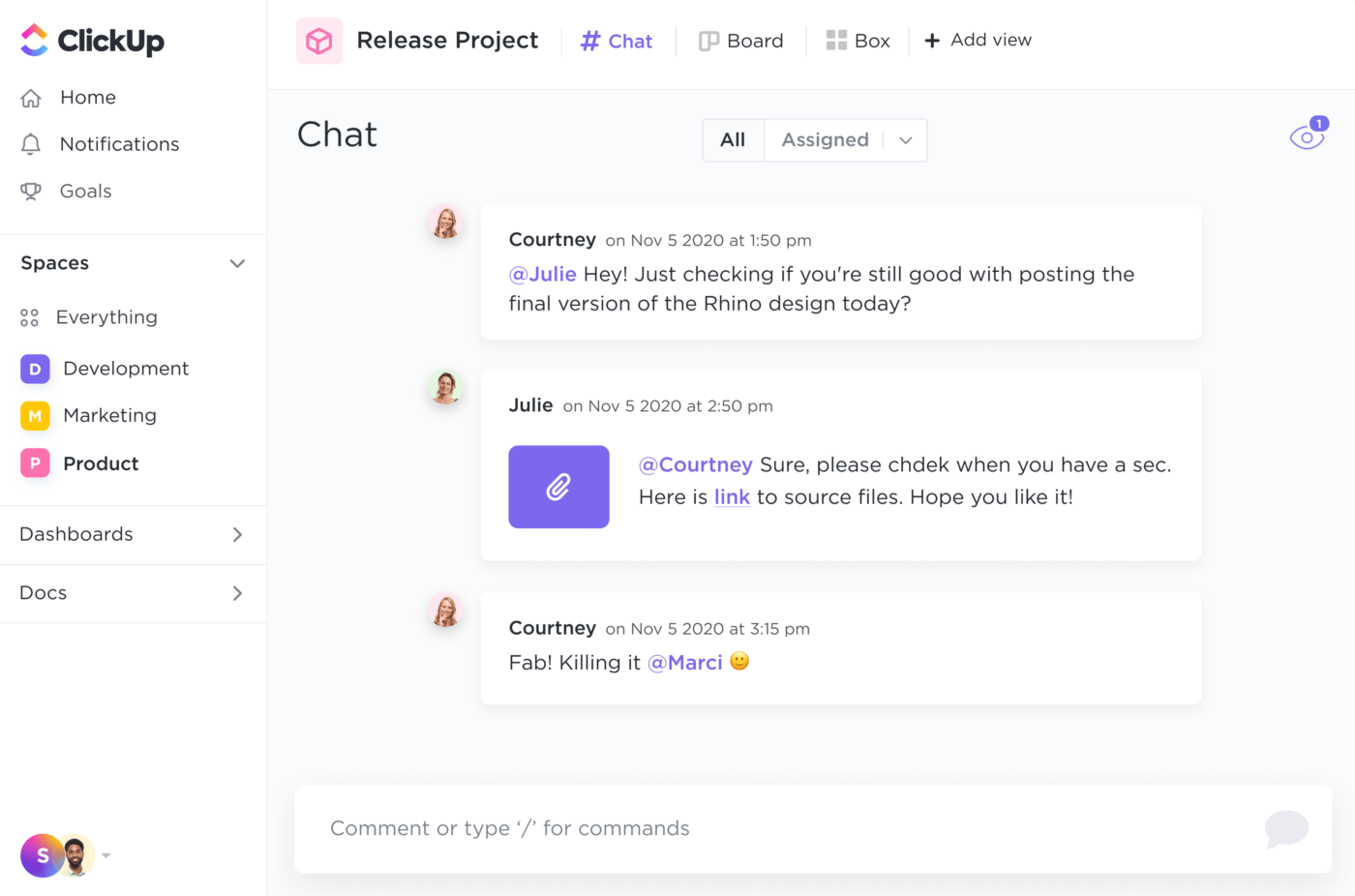Scrum Master vs. Project Manager: What’s the Difference?

Sorry, there were no results found for “”
Sorry, there were no results found for “”
Sorry, there were no results found for “”
Confused about the differences between Scrum masters and project managers?
Don’t worry! This is a cause of confusion for many people, given the similarities between the two roles. Many people often use these terms interchangeably, though that’s incorrect.
So, how exactly do these roles differ? Do you need only one or both for an agile project?
If you do a Scrum master vs. project manager comparison, you’ll find some overlaps and clear differences. Read on to learn more about Scrum masters and project managers and their roles and responsibilities.
One of the biggest myths in agile project management is that a Scrum master is the same as a project manager. Some companies even rename their project managers Scrum masters when they first try the Scrum framework. Or they expect Scrum masters to act as project managers.
First, let’s clarify this misconception: Scrum master and project manager are completely different roles and require different skill sets.
A Scrum master is an expert on the Scrum framework and guides the project team in an advisory capacity. On the other hand, a project manager manages all other aspects of a project, from task allocation to ensuring deadlines are met.
Combining the two roles can be disastrous because:
Scrum is a framework for software development that uses agile team collaboration principles. It provides a well-defined set of rules and principles for project teams to better collaborate and manage their work.
It involves breaking a project into sprints—a period within which a specific amount of work must be completed. The goal is to break down a massive project into smaller, achievable goals and make continuous improvements to become more efficient with each sprint.
Scrum teams are encouraged to learn from their experiences and optimize their approach as often as needed.
Though this framework is mainly used for software development, its principles can be applied to any project. Learn all the important Agile Scrum terms before using the Scrum framework.
A Scrum master is responsible for successfully helping a company implement the Scrum process. They train the team members on the agile methodology and the Scrum framework. It’s one of the most important Scrum roles in any project.
They also organize Scrum sprints and help improve team productivity by providing unique insights into agile project management and removing obstacles. They empower the teams to do the work required of them.
This is a specific role that focuses only on Scrum implementation. As such, a Scrum master is not responsible for delegating tasks and managing other aspects of a project.
Here are some key responsibilities of a Scrum master:
As evident, the role is limited to Scrum implementation and has no involvement with other aspects of the project.
A project manager leads a project from start to finish. They’re responsible for allocating tasks, checking progress, managing budgets, and meeting project deadlines.
Here are some key responsibilities of a project manager:
A project manager is involved in all aspects of a project, from ideation to execution and delivery. That’s why they must use a good project management software solution like ClickUp to manage all the tasks.

In a way, yes. A Scrum master requires a specific set of project management skills, and the scope of their role is more limited than that of a project manager. However, there are certain similarities.
Here are some similarities between a Scrum master and a project manager. Both need to:
The similarities end there, though. The scope of the roles and the exact tasks performed by a project manager vs. a Scrum master are vastly different. A project manager’s role is broader than that of a Scrum master.
Though there are many similarities and overlapping skills, pitching a Scrum master vs. a project manager can bring up considerable differences. As such, both roles complement and support each other in Scrum project management.
Here are some distinguishing characteristics of Scrum masters that differentiate them from project managers:
We’ve compiled a quick comparison of the critical differences between the two to end the Scrum Master vs. Project Manager dilemma.
| Scrum Master | Project Manager | |
| Core Focus | Implementing the Scrum framework. | Planning and executing a project end-to-end. |
| Role | Advisory role to guide the team on Scrum principles | Managerial role involving a lot of things from project planning to execution |
| Key Responsibilities | – Educating the team on Scrum principles – Planning Scrum sprints – Conducting Scrum meetings and sprints – Removing obstacles to Scrum implementation | – Setting project goals and deliverables – Defining project scope – Allocating resources and setting a budget – Assigning tasks and setting deadlines – Managing day-to-day project work – Coordinating with various team members – Ensuring the project is completed on time |
| Core Competencies | – Training and mentoring – Facilitating and motivating | – Time management – Decision-making – Team management – Communication |
Unlike project managers, Scrum masters are considered more credible if they have a certification. As it’s a specialized role, certifications are often a must-have rather than a good-to-have for further career growth.
Here are the two most common certifications for Scrum masters:
Project managers do not necessarily need to be certified, though a certification can advance their career growth. The two most popular project management certifications are:
Scrum masters and agile project managers should work collaboratively for a project to be successful. These are complementary roles that require constant communication and joint planning.
So, how can you ensure that both are on the same page and work together to make the project successful?
Follow these tips for agile project management to get the best results from your Scrum projects.
Collaboration between Scrum masters and project managers is crucial to the success of a project.
While both are involved in different aspects of project planning, keeping the other in the loop can help provide a holistic picture.
ClickUp’s Agile Project Management Software can help both Scrum masters and project managers plan their work efficiently. If you’re a project manager, the ClickUp Project Plan Template can make your job easier. The image below shows a sample project plan, which you may modify to suit your requirements.
While this is more useful for project managers, Scrum masters can use the ClickUp Scrum Sprint Planning Template to create a Scrum workflow.
The Scrum workflow will include your daily Scrum meeting, sprint planning, review schedule, and a sprint retrospective to optimize the strategy for the next sprint.
Collaboration between Scrum masters and project managers is not merely for the planning stage but should continue throughout the project.
Since there are interdependencies in Scrum project management, it’s important to have an open communication channel and keep each other updated on the latest developments.
For instance, Scrum masters should inform project managers in case of any changes in resource requirements. Similarly, project managers should let Scrum masters know of any delays that may affect the sprints.
Use ClickUp’s Chat View for effective communication. Add comments, share links or resources, and tag the person you’re leaving a comment for.

Good project management software can save project managers and Scrum masters time and effort. Tools like ClickUp can help you easily plan, manage, and execute agile development projects.
Some specific features of ClickUp’s Project Management Software are especially helpful. Let’s discuss some of these.
As mentioned earlier, Scrum masters must plan sprints and schedule regular Scrum meetings to stay on top of things. The Scrum process can be tedious if you don’t have the right tools.
ClickUp offers useful Scrum project management features to help you plan your sprints more efficiently.
Use the ClickUp Agile Scrum Management Template, for example, to simplify your sprint planning and meeting scheduling. It offers a visual board view that lets you see all the planned activities and meetings at one glance.
The ClickUp Board View is also suitable for managing your sprints and meetings. It lets you see all the tasks with their current status, such as to-do and ready for sprint.

ClickUp also offers numerous tools for project managers to plan and execute projects efficiently. From goal setting to project planning, ClickUp helps with all aspects of agile project management.
For instance, the ClickUp Gantt Chart View is perfect for planning your entire project schedule and its various activities. It provides a clear visual timeline for completing various activities, making task tracking much easier.
ClickUp offers various Gantt Chart project templates for different use cases and scenarios. Customize and use these to make the process quicker and easier for yourself.
ClickUp offers various useful features for Scrum masters and project managers and can help manage different project aspects.
For instance, ClickUp lets you create detailed tasks, track them, and allocate them to multiple assignees.

In addition, you can view all tasks related to a project in one dashboard and sort and filter them according to task owner, completion status, etc.
Both Scrum masters and project managers are important for the successful completion of a Scrum project. While the former is a technical and mentorship role, the latter is a managerial role.
Irrespective of the differences, both are responsible for a project’s success and require the best tools and resources. A good project management software solution like ClickUp is perfect for that. It can help with all aspects of project planning and execution, from setting goals to tracking the completion status of various tasks.
Sign up today and explore its many features to help you with all your agile project management needs.
An agile project manager is a person responsible for handling an agile project from start to finish. They are responsible for planning and executing the project, including allocating tasks, keeping tabs on their completion status, and ensuring that deadlines are not missed.
A product owner is the point of contact from the client’s side, who is responsible for ensuring that the development team creates a product with maximum value. They oversee the team’s tasks on a product development project and ensure they work efficiently and effectively to deliver maximum value to the company.
Absolutely! It is a lucrative career in demand and will be in the future. As more and more companies adopt the agile methodology and Scrum framework, the demand for such specialized roles will only grow.
© 2025 ClickUp